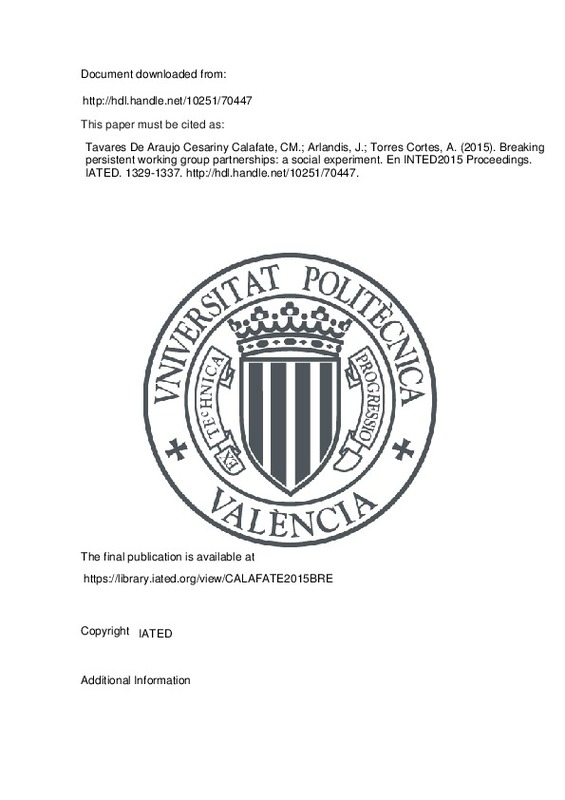JavaScript is disabled for your browser. Some features of this site may not work without it.
Buscar en RiuNet
Listar
Mi cuenta
Estadísticas
Ayuda RiuNet
Admin. UPV
Breaking persistent working group partnerships: a social experiment
Mostrar el registro sencillo del ítem
Ficheros en el ítem
| dc.contributor.author | Tavares de Araujo Cesariny Calafate, Carlos Miguel
|
es_ES |
| dc.contributor.author | Arlandis, Joaquim
|
es_ES |
| dc.contributor.author | Torres Cortés, Álvaro
|
es_ES |
| dc.date.accessioned | 2016-09-26T15:51:11Z | |
| dc.date.available | 2016-09-26T15:51:11Z | |
| dc.date.issued | 2015-03 | |
| dc.identifier.isbn | 978-84-606-5763-7 | |
| dc.identifier.issn | 2340-1079 | |
| dc.identifier.uri | http://hdl.handle.net/10251/70447 | |
| dc.description.abstract | Facing multidisciplinary projects is becoming quite common in companies worldwide, meaning that experts from a specific area must team up with experts from other areas in a dynamic, ad hoc manner. For a professional to meet such requirements successfully, it is important that teamwork skills are developed during college. However, such issue is usually not addressed thoroughly, and most students end up teaming with the same partners over and over again, thereby failing to achieve the critical adaptability skills expected from them. To address this drawback, in this paper we present the results of a study where students were forced to team up with other partners based on the results of a computer networking skills-ranking exam. Experimental results confirm the repeating pattern in terms of past partnerships, and student resistance to partner changes. On the positive side, results show that having new partners indeed help at achieving a more even task distribution, and that students are moderately aware of the upcoming challenges in their future professional activity, recognizing the benefits of teaming up with new people. | es_ES |
| dc.description.sponsorship | This work was partially supported by the School of Informatics (ETSINF) and the Department of Computer Engineering (DISCA) at the Universitat Politècnica de València. | es_ES |
| dc.format.extent | 9 | es_ES |
| dc.language | Inglés | es_ES |
| dc.publisher | IATED | es_ES |
| dc.relation.ispartof | INTED2015 Proceedings | es_ES |
| dc.rights | Reserva de todos los derechos | es_ES |
| dc.subject | Working group | es_ES |
| dc.subject | Classroom experiment | es_ES |
| dc.subject | Survey | es_ES |
| dc.subject | Partner assignment | es_ES |
| dc.subject.classification | ARQUITECTURA Y TECNOLOGIA DE COMPUTADORES | es_ES |
| dc.title | Breaking persistent working group partnerships: a social experiment | es_ES |
| dc.type | Capítulo de libro | es_ES |
| dc.type | Comunicación en congreso | es_ES |
| dc.rights.accessRights | Abierto | es_ES |
| dc.contributor.affiliation | Universitat Politècnica de València. Departamento de Informática de Sistemas y Computadores - Departament d'Informàtica de Sistemes i Computadors | es_ES |
| dc.contributor.affiliation | Universitat Politècnica de València. Escola Tècnica Superior d'Enginyeria Informàtica | es_ES |
| dc.contributor.affiliation | Universitat Politècnica de València. Escuela Técnica Superior de Ingeniería del Diseño - Escola Tècnica Superior d'Enginyeria del Disseny | es_ES |
| dc.description.bibliographicCitation | Tavares De Araujo Cesariny Calafate, CM.; Arlandis, J.; Torres Cortes, A. (2015). Breaking persistent working group partnerships: a social experiment. En INTED2015 Proceedings. IATED. 1329-1337. http://hdl.handle.net/10251/70447 | es_ES |
| dc.description.accrualMethod | S | es_ES |
| dc.relation.conferencename | 9th International Technology, Education and Development Conference (INTED 2015) | es_ES |
| dc.relation.conferencedate | March 2-4, 2015 | es_ES |
| dc.relation.conferenceplace | Madrid, Spain | es_ES |
| dc.relation.publisherversion | https://library.iated.org/view/CALAFATE2015BRE | es_ES |
| dc.description.upvformatpinicio | 1329 | es_ES |
| dc.description.upvformatpfin | 1337 | es_ES |
| dc.type.version | info:eu-repo/semantics/publishedVersion | es_ES |
| dc.relation.senia | 294025 | es_ES |
| dc.contributor.funder | Universitat Politècnica de València | es_ES |





![[Cerrado]](/themes/UPV/images/candado.png)

